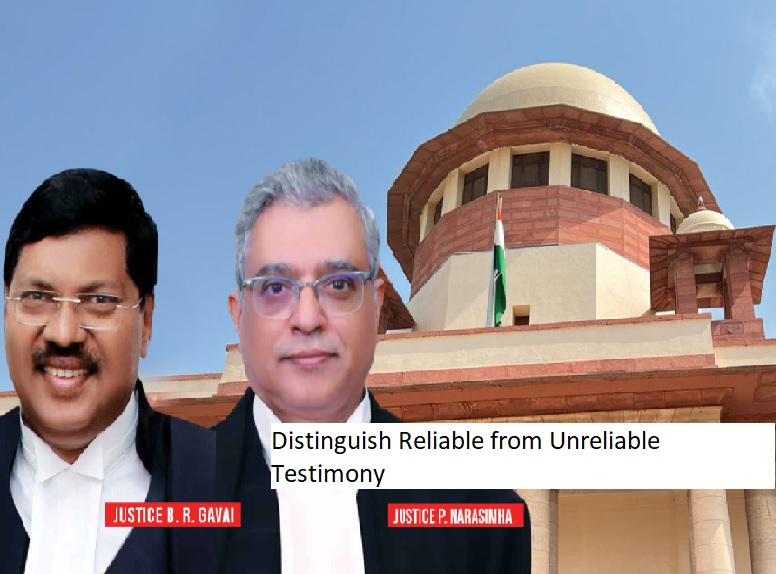


On November 8, the Supreme Court rendered a pivotal decision, setting aside a murder conviction and reiterating a fundamental legal principle regarding the categorization of witnesses into three distinct types: wholly reliable, wholly unreliable, and those who fall somewhere in between—neither wholly reliable nor wholly unreliable. The court, comprising Justices B.R. Gavai, P.S. Narasimha, and Aravind Kumar, emphasized the challenges it faces when dealing with testimony that is partly reliable and partly unreliable.
The court underscored its reliance on the landmark decision in Vedivelu Thevar v. State of M, a case that presumably established a precedent for handling different types of witnesses. According to this legal framework, testimonies from the first two categories—wholly reliable and wholly unreliable—can be readily accepted or dismissed. However, the court acknowledged the intricacy involved in scenarios where testimonies exhibit a mix of reliability and unreliability.
In the specific case before the court, an appeal was filed against the Madhya Pradesh High Court's order, which had affirmed the conviction of Rameshwar (now deceased) and Balaram under various provisions of the Indian Penal Code, including Section 302 (punishment for murder). The prosecution contended that the incident leading to the conviction occurred when Ramkali (PW.5), Mulchand (PW.6), and their son Ashok were attacked while traveling on a bullock cart, resulting in Ashok's death. Of the six individuals tried, the trial court convicted Rameshwar and Balaram, a decision upheld by the High Court.
Advocate R. Chandrachud, representing the appellant, argued that four other accused, tried based on the same evidence, were acquitted, casting doubt on the alleged motive of previous enmity. The counsel asserted that previous enmity is a double-edged sword, allowing for the possibility of false implication, and therefore urged for the appellant's acquittal.
Contrastingly, Advocate V.V.V. Pattabhiram, Deputy Advocate General for the State of Himachal Pradesh, argued that the trial court, by separating the chaff from the grain, had found the testimonies of Ramkali and Mulchand reliable, especially when corroborated by medical evidence.
Upon scrutinizing Ramkali's testimony, the Supreme Court concluded that it linked the appellant, Balaram, to an assault on her leg but did not establish a connection with the deceased, Ashok. Similarly, Mulchand's evidence attributed fire injuries to three individuals. The trial court, based on this, had acquitted one accused while convicting the other two. However, the Supreme Court noted an inconsistency in the trial court's approach, expressing doubt about the separate standards applied to the testimonies concerning the accused individuals.
The court observed, "We find that when the Trial Court has disbelieved the testimony of PW.5-Ramkali and PW.6-Mulchand insofar as accused Uma Charan was concerned, it could not have applied a separate standard while considering the case of the present appellant-Balaram and Rameshwar (since deceased).”
In light of these observations, the court held that the testimonies leading to the conviction were wholly unreliable and, consequently, should be discarded entirely. The testimonies of Ramkali and Mulchand were deemed to fall into the category of wholly unreliable witnesses.
This case highlights the critical importance the Supreme Court places on distinguishing between reliable and unreliable testimonies. The court's scrutiny of inconsistencies in the trial court's approach underscores its commitment to upholding the principles of justice and ensuring a fair and unbiased legal process. The decision serves as a reminder of the nuanced challenges inherent in assessing the credibility of witnesses, particularly in cases where testimonies present a mix of reliability and unreliability.
TAGS: Supreme Court Murder Conviction Testimony Witnesses Wholly Reliable Wholly Unreliable Partly Reliable/Partly Unreliable